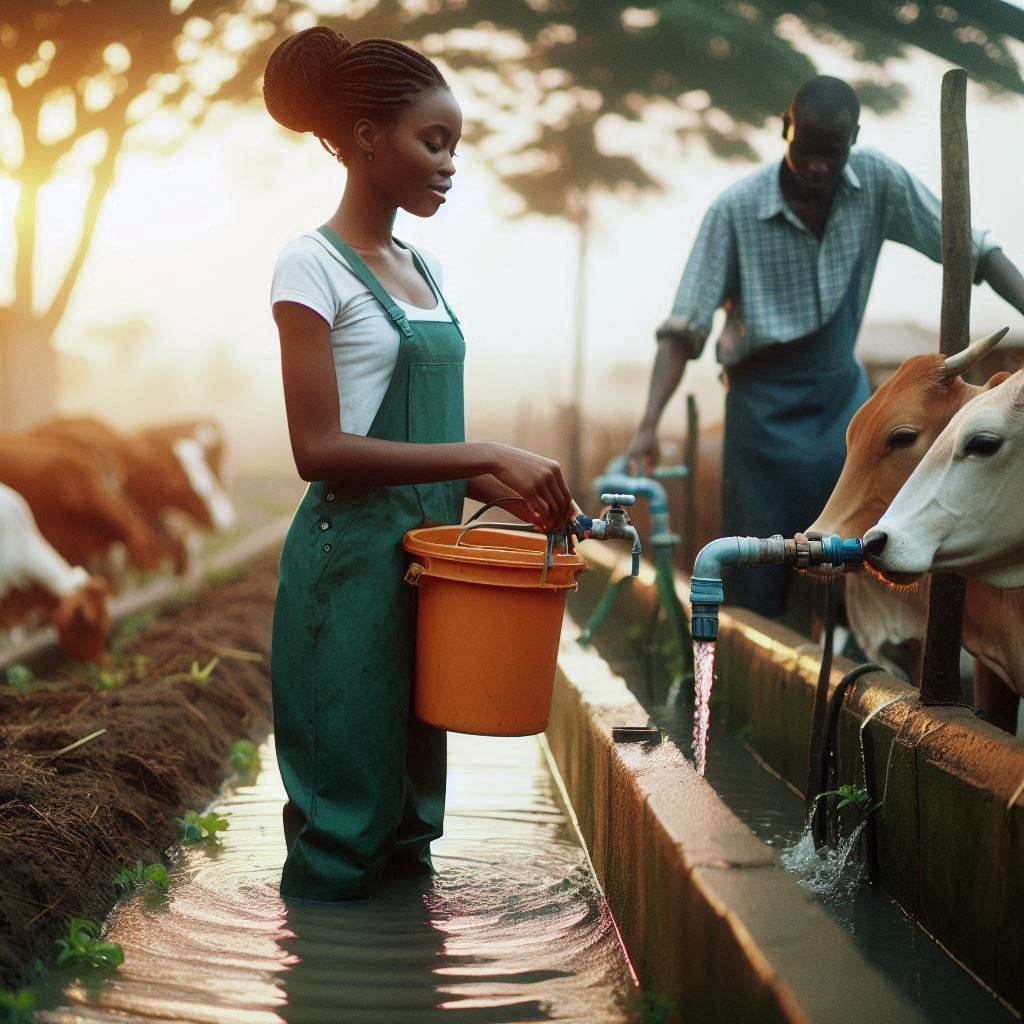Introduction
Effective water management is crucial for livestock farms, ensuring animal health and productivity. Water is essential for drinking, sanitation, and feed preparation.
Proper water management practices ensure livestock have access to clean, adequate water, vital for their well-being and productivity. Without efficient water management, farms face serious issues such as diseases, reduced productivity, and increased operational costs.
Livestock farmers in Nigeria encounter significant challenges in managing water resources. Erratic rainfall patterns and prolonged dry seasons make maintaining a consistent water supply difficult.
Many lack access to reliable water sources, exacerbating water scarcity. Outdated infrastructure and insufficient storage facilities contribute to water resource inefficiency and waste. These challenges hinder farmers from providing adequate water consistently.
Water scarcity not only affects animals but also impacts overall farm operations, leading to poor hygiene and sanitation conditions. This increases the risk of disease outbreaks among livestock.
Additionally, inadequate water supply reduces feed preparation effectiveness, impacting animal nutrition and growth. Addressing these challenges necessitates innovative, sustainable water management solutions tailored to the local context.
Implementing efficient water use practices and modern technologies can significantly improve livestock farming outcomes. Solutions such as rainwater harvesting, constructing efficient water storage systems, and adopting water-saving techniques can mitigate water scarcity effects.
Educating farmers about water management’s importance and providing necessary tools and resources promotes sustainable farming practices.
Effective water management is vital for animal health and overall livestock farming sustainability. Addressing water management challenges ensures a stable, productive agricultural sector in Nigeria.
Consistent access to clean water improves animal health, increases productivity, and enhances farm profitability.
Overcoming these challenges requires collaboration between farmers, government agencies, and agricultural organizations to develop and implement practical water management strategies.
Overview of Current Water Management Practices
Livestock farms traditionally use various methods to manage water resources for their animals. These practices often involve manual labor and outdated techniques that can be inefficient and unsustainable in the long run.
Description of Traditional Methods Used by Livestock Farmers
- Watering troughs: Farmers typically use open watering troughs for their livestock to drink from. These troughs are manually filled with water, often multiple times a day.
- Ponds and streams: Some farms rely on natural water sources such as ponds or streams to provide water for their animals. However, these sources can be unpredictable in terms of availability.
- Rainwater harvesting: In some cases, farmers collect rainwater in storage tanks or barrels to supplement their animals’ water supply. This method is dependent on weather conditions.
- Hand pumps: In remote areas without access to a piped water supply, farmers may use hand pumps to extract water from wells or boreholes for their animals.
The Limitations and Inefficiencies of Current Practices
While these traditional water management practices have been in use for years, they are not without their limitations and inefficiencies:
- Manual labor: The manual filling of watering troughs and hand pumping of water can be physically demanding and time-consuming for farmers.
- Dependency on weather: Relying on natural water sources or rainwater harvesting means that farmers are at the mercy of weather conditions, which can be unpredictable.
- Water wastage: Open watering troughs can lead to water wastage through spillage or evaporation, resulting in unnecessary depletion of resources.
- Potential contamination: Stagnant water in ponds or streams can become contaminated with pathogens or pollutants, posing health risks to animals.
- Inadequate supply: In times of drought or water scarcity, traditional methods may not provide enough water to meet the needs of livestock, leading to dehydration and poor health.
In light of these limitations, it is essential for livestock farmers to explore more sustainable and efficient water management solutions that can ensure the well-being of their animals while conserving precious resources.
By upgrading water management practices on livestock farms, farmers can improve efficiency, reduce labor, and promote the sustainable use of water resources for the benefit of both animals and the environment.
Water Conservation Techniques for Livestock Farms
Water is a precious resource, especially on livestock farms where animals require a significant amount of water for drinking, cleaning, and cooling. Implementing water conservation techniques is crucial to ensure sustainable farming practices and efficient use of resources.
Explanation of Modern Water Conservation Techniques
- Utilization of rainwater harvesting systems to capture and store rainwater for agricultural use.
- Installation of water-efficient irrigation systems such as drip irrigation or micro-sprinklers.
- Implementing water recycling and reuse systems to minimize water wastage.
- Regular maintenance of water pipelines and equipment to prevent leaks and ensure optimal water flow.
- Monitoring water usage through smart meters and sensors to identify areas for improvement.
Examples of Technologies and Strategies for Livestock Farms
- Installing automated waterers in animal pens to provide a controlled amount of water.
- Implementing rotational grazing to prevent overgrazing and reduce water consumption.
- Utilizing solar-powered water pumps to reduce energy consumption and costs.
- Constructing water catchment ponds to collect and store runoff water for future use.
- Using water-saving devices such as low-flow nozzles and pressure regulators in water systems.
By incorporating these modern water conservation techniques and technologies, livestock farms can significantly reduce their water usage, decrease their environmental impact, and improve overall sustainability.
It is essential for farmers to continuously assess and upgrade their water management practices to ensure efficient water utilization and long-term success in the agricultural industry.
Read: Forestry and Climate Change: Nigeria’s Response and Education
Benefits of Efficient Water Management
- Proper water management enhances livestock health and overall well-being.
- Reduced water wastage leads to cost savings for the farm.
- Improved water quality results in better animal performance and productivity.
- Effective water management practices contribute to sustainable agricultural operations.
Highlighting the Advantages of Proper Water Management for Livestock Farms
- Prevents waterborne diseases in livestock, reducing the need for costly treatments.
- Ensures consistent access to clean water, promoting optimal animal hydration.
- Minimizes the risk of water contamination, safeguarding animal and human health.
- Enhances nutrient absorption and digestion in livestock, improving overall feed efficiency.
How Improved Water Management Can Increase Productivity and Profitability
- Optimal water supply encourages higher feed intake, leading to improved weight gain.
- Proper hydration levels boost reproductive performance and fertility rates in livestock.
- Reduced water stress improves animal behavior and reduces aggression within the herd.
- Enhanced water efficiency allows for increased stocking densities and improved farm profitability.
Read: Sustainable Forestry Practices: How Nigeria’s Universities Teach It
Case Studies of Successful Water Management Solutions
In recent years, there have been several successful water management solutions implemented on livestock farms around the world. These case studies serve as valuable examples of how effective water management practices can positively impact the operations and outcomes of farms.
Farm in Nigeria
- Implemented rainwater harvesting system
- Reduced dependence on unreliable water sources
- Improved water quality for livestock
- Increased farm productivity and sustainability
This farm in Nigeria successfully implemented a rainwater harvesting system to collect and store water for their livestock. By reducing their dependence on unreliable water sources, they were able to ensure a consistent supply of clean water for their animals.
This not only improved the health and well-being of the livestock but also increased the overall productivity and sustainability of the farm.
Farm in Australia
- Installed automated water monitoring system
- Optimized water usage and reduced waste
- Identified leaks and issues promptly
- Lowered water bills and operating costs
Another successful case study can be found on a farm in Australia that installed an automated water monitoring system. This system helped the farm optimize their water usage, reduce waste, and identify leaks or issues promptly.
As a result, the farm was able to lower their water bills and operating costs, leading to increased profitability and efficiency.
Farm in the United States
- Implemented drip irrigation system for pastures
- Reduced water consumption and runoff
- Improved pasture quality and forage production
- Enhanced overall animal health and well-being
Lastly, a farm in the United States successfully implemented a drip irrigation system for their pastures. This innovative approach not only reduced water consumption and runoff but also improved pasture quality and forage production.
The enhanced nutrition from the pastures led to better animal health and well-being, ultimately benefiting the farm in terms of improved livestock performance and profitability.
Therefore, these case studies of successful water management solutions on livestock farms demonstrate the positive impact that effective practices can have on farm operations and outcomes.
By adopting innovative and sustainable water management techniques, farms can ensure a reliable and clean water supply for their livestock while also improving productivity, sustainability, and profitability.
Read: Career Prospects in Forestry: Opportunities in Nigeria & Beyond

Importance of Collaboration and Education
- Emphasizing the need for collaboration among stakeholders in the livestock industry to promote better water management practices.
- Suggesting the role of education and training programs in building awareness and capacity for improved water management.
Collaboration Among Stakeholders
Collaboration is essential in addressing water management challenges on livestock farms. Farmers, government agencies, environmental organizations, and researchers must work together to develop sustainable solutions.
By sharing knowledge, resources, and best practices, stakeholders can collectively implement effective water management strategies. Collaboration can lead to the development of innovative techniques that benefit both the environment and livestock operations.
Importance of Education and Training
Education plays a crucial role in promoting sustainable water management practices on livestock farms. Training programs can raise awareness about the impact of water usage on the environment and the importance of conservation.
By educating farmers and farm workers, we can foster a culture of responsible water use. Training programs can provide practical skills and tools to improve water management efficiency on farms.
Building Awareness and Capacity
Educational initiatives can increase awareness about the water-related challenges facing the livestock industry. Through workshops, seminars, and online resources, stakeholders can learn about the latest water management technologies and practices.
Building the capacity of individuals within the livestock industry is essential for long-term sustainability. By equipping farmers with the knowledge and skills needed to implement water-saving strategies, we can ensure the viability of livestock farms for future generations.
Collaboration and education are key components in promoting effective water management solutions for livestock farms.
By working together and investing in education and training programs, stakeholders can achieve sustainable water use practices that benefit both the industry and the environment.
Read: Comparing Forestry Curriculum: Nigeria vs. Global Standards
Conclusion
In summary, the importance of water management for livestock farms cannot be overstated. Clean and adequate water is essential for ensuring the health, productivity, and overall well-being of animals.
By implementing effective water management practices, farmers can mitigate the risks associated with water scarcity and ensure the long-term sustainability of their operations.
Livestock farmers must recognize the critical role they play in managing water resources responsibly. Adopting sustainable water management solutions is not only beneficial for their farms but also for the environment and surrounding communities.
It is imperative for farmers to prioritize the conservation and efficient use of water resources to minimize wastage and ensure future availability.
Therefore, I urge all livestock farmers to take proactive steps towards adopting sustainable water management practices on their farms.
This includes implementing measures such as rainwater harvesting, investing in efficient irrigation systems, and promoting water-saving techniques.
By embracing sustainable water management, farmers can safeguard the health and productivity of their livestock while contributing to a more resilient and sustainable agricultural sector.




